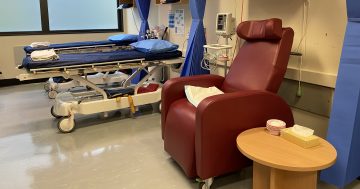
More women in the ACT self-rate their health as ‘fair’ or ‘poor’ rather than ‘very good’ or ‘excellent’, according to a new survey. Photo: File.
Women in the ACT seeking to access medical care still face considerable barriers, the results of a recent survey suggest.
The survey conducted by Women’s Health Matters (WHM) found many women did not have satisfactory services for common reproductive health conditions such as endometriosis and polycystic ovarian syndrome (PCOS).
The results also suggested despite a high prevalence of mental health conditions among women in the ACT, only some women were accessing treatment.
More than one-third of respondents said they felt doctors were taking them only somewhat seriously or not at all seriously, while one-quarter said they avoided seeing a doctor wherever possible.
WHM surveyed more than 1600 women about their experiences of general health and mental health, health information and health services, sexual and reproductive health, pregnancy and parenting, discrimination, safety and violence.
Datasets on women’s health in the ACT have previously been considerably smaller, so this research is vital to better understand the areas where improvement is needed.
“This major survey will help us to see where the health system could work better to address the needs of different groups of people, and where we need to remove barriers,” WHM CEO Lauren Anthes said.
According to the survey, more women in the ACT self-rated their health as ‘fair’ or ‘poor’ rather than ‘very good’ or ‘excellent’.
“Comparing our findings with other datasets, we can see that people in our survey overall rated their health more poorly than women over 18 in other surveys conducted previously,” the report stated.
While most women rated their access to a GP as excellent, very good or good, more than a quarter (26.4 per cent) rated it as fair or poor. The reasons most commonly given were difficulty getting an appointment and high costs.
Women’s inclination to seek healthcare raised concern with 35 per cent of respondents agreeing or strongly agreeing that they would only see a GP if there was no other option.
Women in the ACT also reported difficulty accessing other categories of health care.
“The kinds of care rated most poorly for access were mental health services, specialists, medical care at short notice and medical care after hours. For every type of care (except telehealth) more people rated their access as fair or poor than rated it as excellent/very good,” the report stated.
Ms Anthes said another outcome “we weren’t necessarily expecting” was the fact respondents reported much higher rates of psychological distress than other recent data.
“Levels of distress and unmet needs in relation to mental health were much higher than what we realised, and this is an area we definitely need to focus on,” she said.
“Our survey found that around 19 per cent of respondents had a K6 score indicating probable serious mental illness. By comparison, the 2021 ACT General Health Survey found 5.6 per cent of female people had a K6 score indicating probable serious mental illness.”
Ms Anthes pointed out there were high rates of mental distress and mental illness reported in general, with about 64 per cent of people reporting they had been treated for or diagnosed with a mental health condition and 45 per cent reporting treatment/diagnosis in the last two years.
However, only about one-third of respondents said they had consulted with a psychologist, counsellor or other mental health worker in the last 12 months, suggesting access to support was still a major issue.
Ms Anthes said the most significant result of the survey was the lack of adequate treatment and support for reproductive health conditions.
“Lots of people who identified having symptoms of endometriosis, PCOS, persistent pelvic pain and symptoms of menopause reported they weren’t satisfied with treatment,” she said.
“This indicates to us we need more attention around sexual and reproductive health.”
More than half the respondents with endometriosis reported being dissatisfied or very dissatisfied with their healthcare for the condition, while 54 per cent of respondents with PCOS said they were dissatisfied or very dissatisfied. For persistent pelvic pain, this figure was almost 60 per cent.
“The burning priority area now is to call for a sexual and reproductive health strategy in the ACT,” Ms Anthes said.
She said WHM, supported by the ACT Health Directorate, would work with the ACT Government to use the results of the survey to better inform health policy and ensure these barriers were addressed.
“It isn’t just the health system, also education and workplaces,” she said. “We want employers to talk about a reproductive health-led policy.”





















